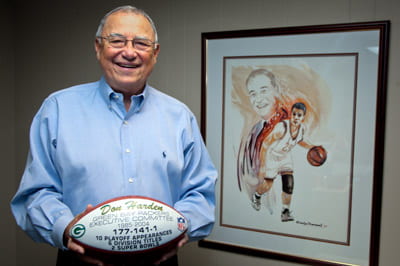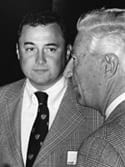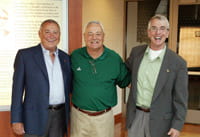Harden could write the book on collaboration
 Missions of magnitude are rarely done in isolation.
Missions of magnitude are rarely done in isolation.
While Don Harden had a magnificent career as an administrator at UW-Green Bay, and will long be credited for many of the University’s most visible success stories to date —NCAA Division I athletics and student housing the most noteworthy — he is quick to acknowledge that he didn’t go at it alone.
“VanderPerren, Long, Small, Walter, Warren, Robishaw, Downham, Temp, Baer, Rose… those were the people that made significant contributions to the location and development of the University here in Green Bay,” Harden says. “These men wanted the University to be successful and knew it would lead to the well-being of the region. A successful university means opportunities for first-generation college students and economic support for the region.”
 Harden’s strength was energetic leadership — encouraging collaboration and partnerships, appointing key management and orchestrating funding and seed money for new projects. And he did the vast majority of his work with the ear-to-ear smile for which he is well known.
Harden’s strength was energetic leadership — encouraging collaboration and partnerships, appointing key management and orchestrating funding and seed money for new projects. And he did the vast majority of his work with the ear-to-ear smile for which he is well known.
From his home just a stone’s throw from the University’s arboretum, Harden would be well-positioned to relax and reflect on a long and distinguished career — if only he weren’t so busy. He continues to serve UW-Green Bay, this time in a volunteer capacity, as a member of the UW-Green Bay Foundation Inc. board of directors, as chair of the organization’s development committee, and as a member of the Chancellor’s Council of Trustees.
When asked to look back, he recalls both victories and frustrations as he and others worked to grow UW-Green Bay from a struggling commuter school to a full-fledged comprehensive University serving the higher education needs of Northeastern Wisconsin and beyond.
Among the thousands of board meetings and administrative meetings, social functions and special events, one conversation stands out as pivotal.
“One evening, my neighbor Jack Robishaw, a brilliant man, who had a great interest in the University, and I were having a cocktail on the back deck. Conversation turned to the University and he felt passionately that we needed to find something to springboard the University to success. We came to the conclusion that we couldn’t grow and we wouldn’t improve the quality and quantity of student leadership without residence halls. We felt that students needed to live on campus as freshmen and sophomores to become engaged. Jack and the others… they didn’t do this for any sort of financial gain, self-aggrandizement… they wanted to do something that would help the University. Out of that discussion came the idea for a 501c3 (non-profit organization) — later to be named University Village Housing Inc. (UVHI) — that could build residence halls on our campus. We identified the guy, Bob Schaefer, who had important connections, to spearhead the thing.”

Harden at dedication ceremony of Donald Harden Hall.
“Up until that point, the only option available to UWGB students was the Bay Apartments,” according to UW-Green Bay’s Vice Chancellor for Business and Finance Tom Maki. “And because beds were going unfilled in student housing across the state, the UW System was not able to construct additional student housing, even at a new university like UW-Green Bay. That might be fine for urban campuses because students can find housing elsewhere, but it really hindered a campus such as ours from growing our program and enrollment. What the 501c3 did for us was pass responsibility to the organization rather than the State of Wisconsin and the UW System to fill beds. It gave us the ability to grow.”
The UVHI collaboration would eventually be recognized as one of the finest examples of public/private partnership not only in the UW System but across much of higher education.
None of it would have been possible, colleagues now say, had Harden not done what consultants said was impossible — he rallied local support for an ambitious $2.2 million fundraising campaign, the institution’s first. The campaign yielded the upfront money for a loan that could be used for construction of the University’s first residence halls. The four new halls would house 240 students.
What started as a backyard conversation between Harden and Robishaw led to a partnership that has been a fiscally responsible way of providing housing for more than 2,000 students at present, about one-third of today’s full-time campus enrollment at UW-Green Bay.
With bulldozers and backhoes humming, Harden turned his attention to a challenge given him by Chancellor Edward Weidner: “National Prominence.”
“Taking our successful athletics program to Division I was controversial,” Harden recalls. “In fact, a local sportswriter called me ‘unwise, uninitiated and uninformed,’ he says with a laugh and a hint of touché in his voice. But it was simple. We wanted, in marketing our University, to position ourselves in prominence with Marquette and Madison. We felt we could do it in men’s basketball. We felt with five guys, a couple of role players and great leadership, we could be successful.”
Participation as part of a Division I conference would mean increased regional and national television exposure for the University, and the potential for post-season play and increased revenue for the program.
Harden did what he’s known for, and rolled up his sleeves and forged a few new friendships while serving as chief negotiator for the University’s first Division I conference affiliation — the Association of Mid-Continent Universities (AMCU). Original members included Cleveland State, Eastern Illinois, the University of Illinois at Chicago, University of Northern Iowa, Missouri State, Valparaiso and UW-Green Bay.
In 1994, Harden on behalf of UW-Green Bay, as well as Midwestern Collegiate Conference (MCC) Commissioner Jon LeCrone and Wright State President Paige Mulhollan, began the discussions which led to the largest non-merger conference expansion in NCAA history at that time. UW-Green Bay became part of the MCC, with members Cleveland State, University of Illinois-Chicago (UIC), UW-Milwaukee, Wright State, Detroit, Butler, Loyola and Northern Illinois. Northern Illinois has since left, and Youngstown State and Valparaiso joined in 2001 and 2007, respectively. In 2001, the MCC changed its name to the current Horizon League.
“I spent a lot of time on that,” says Harden. “I was selling our campus as one that would be a great contributor. As I look back, it worked out very well. The impressive advantage of building a conference of substantial strength has been very important to the University and the region over the years.”
Meanwhile, Harden summoned UW-Green Bay employees Ruth Ann Kasten, who worked closely with Harden in both community relations and annual giving, and Irene Kiefer, the director of communications, to initiate a fundraising organization — The Phoenix Fund. Its founding mission was to take some of the financial burden of the fledgling program off the University. The Phoenix Fund has thrived, and now boasts a record 817 members and donations of more than $400,000 annually.
The move to D-I wasn’t without its struggles. In 1981-82, its first at Division I, the team fell to 14-13 after more than a decade of D-II success under Head Coach Dave Buss. Buss left and Dick Lien was hired, but was let go after the team struggled for three more seasons and failed to finish higher than 6th in the AMCU.

Don Harden with Dick Bennett (center) and Dan Spielmann (right)
But there was a gentleman coaching at UW-Stevens Point who had captured Harden’s attention years before in leading the Pointers to the NAIA title game in 1984. This coach was earning quite a reputation as a mastermind.
“I had followed Dick Bennett from the time he was coaching Eau Claire Memorial. I don’t think his center was six-feet, but they went to the state championship with his help-and-recover defensive style and great rebounding and shot selection. He was hired by UW-Stevens Point, and we knew he wouldn’t leave while coaching Terry Porter (later an NBA star). But when we had the opportunity, we knew he was the best fit for our campus.”
Harden’s instincts proved to be prophetic. Bennett took over in 1985, and led UW-Green Bay’s most successful Division I men’s basketball teams, to date, with three NCAA tournament appearances and two NIT invitations in a decade. The school received major national press for the first time since opening as “Eco U” in the 1960s. Other Phoenix teams have thrived, as well. Just this past year, the Phoenix women’s basketball team, which hasn’t had a losing season in more than three decades, posted its best finish ever with a 34-2 record, a No. 9 national ranking and a spot in the NCAA Tournament’s Sweet 16. Other sports — including swimming and diving, Nordic skiing, soccer, volleyball and softball — have found success through the years as Conference champions.
Harden’s colleagues describe the move to Division I as “priceless.”
“The regional, State and national recognition UW-Green Bay has gained from being DI is priceless,” said Irene Kiefer, former executive director of the Office of Marketing and Communication, who worked with Harden in community relations, events management, fundraising and communication for more than two decades. “You can’t put a price on what that same recognition would cost an institution if it had to pay for it in advertising dollars.”
Kiefer says it is Harden’s rare ability to see past problems and roadblocks that make him so successful.
“He doesn’t let you get bogged down with impediments; you just deal with them and keep moving forward,” she said. “He’s very gracious about saying that he has been successful because he has had good people around him, but of course there is more to it than that. His vision, tenacity, and ability to motivate others make him a great leader. Being a lot of fun doesn’t hurt, either, and it helps keep your staff loyal and the competition off balance.”
Dan Spielmann, who served as the University’s athletics director during “the Bennett years,” and worked with Harden on many non-athletic-related activities, said that Chancellor Weidner tended to assign Harden the difficult tasks.
“Ed (Weidner) gave Don the tough jobs,” says Dan Spielmann. “Athletics, fundraising, housing… those were the tough jobs and it took a special skill. Don is highly regarded in the community. The notion of athletics moving to Division I was teetering and Don had the cache’, so to speak, the respect of community leaders, to get the buy-in. Don was seen as an equal with community leaders.”
“Don sees the big picture at all times,” Spielmann observes. “He focuses in on the important issues and is very good at delegating without being a micro-manager. And I think those who worked for him felt as though you had his support. People would regard him as generally easy going with a great sense of humor. But he could also be intense, but you always know where you stood. There was no hidden agendas, no games.”
Added Kiefer, “Don always defined the goals; gave the resources to do the job; helped when help was needed; praised when it is deserved, and showed his trust by getting on with his part of the job, keeping everyone fully informed and otherwise staying out of staff’s way. And he shared the glory if glory was won. It is a very empowering style.”

Edward L. Harden, Ph.D.
The son of a University president, Edgar L. Harden, Ph.D., Harden had ample opportunity to leave UW-Green Bay for more prestigious positions at more established colleges and universities. But a University that needed him, a community that provided great schools for his children Ed and Betsy, and an entrepreneurial environment for his wife, Phyllis, a businesswoman in her own right, set the stage for Harden’s long career in Green Bay.
Also compelling him to stay was the opportunity to be on the seven-member Executive Committee of a National Football League franchise — the Green Bay Packers. During his time with the Packers, from 1985 to 2004, Harden was part of the decision-making team that saw a 177-141-1 record, 10 playoff appearances, six division titles and two Super Bowls as well as the renovation of Lambeau Field.
“It was a pretty good gig,” Harden said of his long career in the Green Bay community. “There aren’t many people who can say they had something to do with the success of a Division I athletics program and a National Football League franchise.”
Harden spent 25 years at UW-Green Bay as an administrator and faculty member, including a short time — July through September of 1986 — as acting chancellor of UW-Green Bay. Other functions that he had senior administrative responsibility over the years included student services, community relations, government relations, alumni relations, IT, library, educational television, media services and the Founders Association. He completed his academic career in 1994 as UW-Green Bay’s associate chancellor, with the rank of full professor. In December of 2006 he received The Chancellor’s Award —UW-Green Bay’s highest community honor and he was inducted as a charter member of the Phoenix Hall of Fame. In 1998, the University honored Harden by naming a new residence hall “Donald F. Harden Hall.”
If Harden has a regret, few and far between, he says, it was that before he left, he wasn’t able to convince others of the importance of the development of an “applied research facility” close to campus.
“Right over there,” he says, pointing to vacant land across the Hwy 54-57 interchange. “We could have had an applied research park, that would have helped new businesses come into being, helped existing businesses, and in many instances, significant interaction between students and faculty and these businesses. There are many other colleges and Universities that have been successful in this kind of thing.”
After leaving, UW-Green Bay, Harden was appointed by Bellin Health Systems as President of its fund-raising foundation. He also has devoted countless hours to volunteer service in support of community initiatives, while serving on numerous agencies and corporate boards, including the Foundation board at UW-Green Bay.
A native of Iowa and a former U.S. Air Force navigator, Harden earned degrees through the doctorate at Michigan State University. He continues to live in Green Bay, but he and Phyllis plan to move to Michigan to be closer to family. “Phyl” says that despite Harden’s high-level of responsibility through the years, the man she met on a Rose Bowl trip during college hasn’t changed a bit over his long career or the years since his retirement.

Don and Phyllis Harden
“He’s always been easy to get a long with, a sweetheart, always with a smile on his face,” she said. “Sometimes, during those difficult times, there was a quietness to him, but he’s never stopped being wonderful. After 54 years, when I see him come into the room, my spirit is lifted, and I’d do it again in a heartbeat.”
So would UW-Green Bay.


